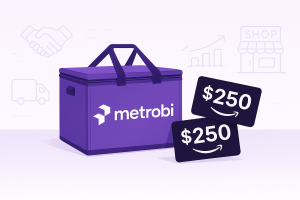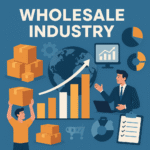Explore the market jungle, not with an explorer’s hat but with a merchant’s eye.
Ever wondered how Costco got its start, trading in bulk commodities like privateer in the era of sail? That’s the allure of wholesale, creating an empire from providing staples for businesses and consumers, alike. Five proven strategies, backed by rigorous market research, amass this treasure chest of knowledge. Like the guiding North Star for aspiring wholesale magnates, these strategies chart the path to prosper in the $8.1 trillion global wholesale market, evidence of an opportunity as large as the GDP of Germany. Dive into the captivating realm of the wholesale trade industry and unlock its potential advantages through this enlightening article that covers the strategic roadmap to succeed in large-scale trading and product distribution.
Welcome aboard. These aren’t mere breadcrumbs on a trail, but a robust GPS to success, navigating the venture oceans. Let these strategies be your compass and sextant, navigating the tumultuous seas, from humble beginnings to ruling the waves.
🌍 Global Wholesale Expansion 🚀
In 2023, the global wholesale market size expanded to $49 billion, showcasing a robust growth trajectory.
Boost customer satisfaction with just a few clicks
Most-Loved Features:
- On-demand drivers
- Real-time GPS tracking
- Delivery confirmation photos
- Over 50% of customers report a smoother delivery experience
Strategy 1: Crafting a Comprehensive Wholesale Business Plan
Not just a document, a wholesale business plan is a roadmap to success that provides clarity, motivation, and a robust strategy for your new business.
- Pinpoint your niche and own it
- Understand market dynamics to guard against surprises
- Define clear business goals for a directed growth
- Have a financial plan in place to ensure a healthy bottomline
Step 1: Identifying Your Niche
By narrowing down your focus to a specific niche, you can specialize, increase your expertise, and tailor your products and services to meet the specific needs of your target market. Building a robust plan for your wholesale business plays a key role in targeting your niche effectively and enhancing profitability.
To start, try listing out potential niches based on your interests and experience. Once you have a list, conduct preliminary research.
Evaluate each niche based on demand, competition, and profitability. This will help you identify a niche that isn’t just viable, but is also profitable.
Step 2: Analyzing the Market
Market analysis is your foundation. It provides valuable data about your competition, market size, market trends, and customer demographics.
Use this data to determine your unique selling proposition (USP); the product, service, or feature that sets you apart from your competition. Your USP should be compelling to your target audience and difficult for your competitors to replicate.
📈 Forecasted Market Surge 📊
By 2027, it's projected that the wholesale market will soar to $62 billion, marking a significant upward trend.
Step 3: Setting Clear Business Goals
A ship without a destination is bound to drift aimlessly, and the same applies to a business without clear goals. Setting SMART (Specific, Measurable, Achievable, Relevant, Time-bound) goals ensures you have a clear view of where you’re heading.
Goals vary based on business intelligence software needs and may include sales targets, growth rates, or market share. Break down these larger objectives into smaller, actionable steps to make them more manageable.
Step 4: Planning for Financial Management
Finances, if not planned well, can be a business’s Achilles heel. This includes initial start-up cost, operational expenses, projected revenues and when you expect to break even.
A key factor in financial planning is understanding business tradelines. What are business tradelines? They refer to credit accounts that appear on a business credit report, helping to establish creditworthiness and secure better financing options.
Creating a thorough financial plan will not only give you a solid foundation for your business, but it will also be instrumental when seeking investment. If possible, engage with a financial advisor or use online resources to help you set this up.
With these steps, you can craft a comprehensive wholesale business plan that’s rooted in research, driven by clear goals, and backed by financial foresight. This lays a strong foundation for your upcoming journey in the wholesale business industry, specifically in wholesale VoIP.
As you establish your wholesale VoIP business, choosing a reliable VoIP phone service can enhance your communication infrastructure and streamline operations.
Metrobi is transforming wholesalers deliveries
Specialized solutions for wholesalers businesses:
- Wholesalers-trained drivers
- Proper handling equipment
- Peak day delivery support
- 23% average cost reduction
Strategy 2: Developing a Robust Wholesale Distribution Strategy
Importance of a Distribution Strategy in Wholesale Business
A robust distribution strategy is the backbone of wholesale businesses, diverting your products from your warehouse straight into the hands of your customers effortlessly.
Optimizing Distribution Strategies for Market Growth 🚀
One FMCG company achieved a 57% gain in distribution presence and unlocked a 10% incremental market share opportunity by optimizing their distribution strategy.
The logic is simple: the more quickly and efficiently you fulfill your customers’ needs, the better your profit margin. It’s about leveraging the dynamics between cost and availability, striking the right balance between keeping your overhead low while ensuring your goods are accessible to a broad customer base. And that share of the market can translate into significant profit.
Key Elements of a Successful Distribution Strategy
When designing a distribution strategy, consider the following pivotal factors: your target market, distribution channels, delivery logistics, and your competition.
Understanding your Target Market
Knowing who your potential customers are, their needs, purchasing habits and preferences will guide you in tailoring your distribution strategies. It’s a dynamic factor; as their needs morph, so should your strategies.
Selecting Suitable Distribution Channels:
Options range from direct selling to using intermediaries such as wholesalers, retailers, or brokers. The choice depends on your market reach, customer preference, and the nature of your products. Cater to customers’ convenience, not your convenience.
Managing Delivery Logistics
Maximizing efficiency in delivering goods to customers enhances satisfaction and loyalty. Plan for reliable inventory levels, speedy shipping, easy returns, and efficient after-sales services.
Analysing Competition:
Learn from your competitors. Analyze their distribution strategies and consider techniques that you can adopt or improve. Be aware of current trends and customer feedback.
📱 Digital Transformation Drive 🌐
The wholesale sector is undergoing digital transformation, incorporating AI and business intelligence to stay competitive.
Case Study: Successful Wholesale Distribution Strategies
Here, let’s delve into a few case studies that illustrate successful wholesale distribution strategies.
Amazon
A Prime Example: Their aggressive strategy of securing distribution centers across the globe has resulted in exemplary delivery speeds and coverage. Leveraging technology, they’ve been able to maintain optimum inventory levels and reduce overhead expenses.
Zara
Master in Fast Fashion: The Spanish fashion retailer’s strong distribution networks and quick turnaround strategy have set them apart. Zara releases new designs every two weeks, which reach all their global stores within 48 hours, keeping their offering fresh, trendy, and in high demand.
The common thread? Both these companies knew their customer base, capitalized on efficient logistics, and exploited technology for optimum results.
🔍 Personalization in B2B Sales 🔑
A significant 52% of marketing leaders are investing in personalization, transforming B2B customer experiences.
Strategy 3: Leveraging Wholesale Market Research for Business Growth
The Role of Market Research in Wholesale Business
In the wholesale business, the importance of market research cannot be overstated. It has a crucial role to play in informing your strategy and helping your business thrive.
As the wholesale landscape grows more competitive day by day, simply sticking to the tried and true may not be suffice. The rate of change in customer demands and market trends calls for a data-driven approach. That’s where market research comes in.
Market research offers a wealth of data about your competitors, market trends, and customers. Parsing through these insights allows wholesalers to uncover opportunities, identify potential pitfalls, and craft effective strategies for business growth.
Pinpointing Your Competitive Advantage
As a wholesaler, your competitive advantage could lie in a quality product, exceptional service, or cost-effectiveness. Market research helps you understand where you shine compared to your competitors. This understanding arms you with the knowledge to market your selling points effectively, securing a larger piece of the market pie.
How to Conduct Effective Market Research
Beyond its undeniable significance, many wholesalers find themselves at a loss on where to start with market research. The process may seem daunting initially, but the benefits it promises far outweigh the effort.
Primary market research, which involves collecting first-hand data, and secondary market research, which involves analysing available data, are two core methods for collecting market intelligence. Surveys, interviews, and observation form part of primary research while industry reports, publications, and competitor analysis contribute to secondary research.
Surveys and Feedback
Surveys can offer valuable insights into customer behavior, interests, and buying patterns. They’re essential tools for maintaining ongoing communication with customers.
Utilizing Market Research Data for Business Decisions
Upon gathering the necessary data, the next step is to draw tangible insights. This critical stage in the process allows wholesalers to strategize their value proposition, marketing strategies, and sales channels.
When translated into executable strategies, data drawn from market research lays the foundation for quantifiable growth. It can underpin decisions such as entering new markets, pricing adjustment, and even simple operational changes for increasing efficiency.
Evidently, market research has a deep-seated role in every facet of wholesale business growth. With a well-informed approach, wholesalers can stay a step ahead and steer their business towards sustainable success.
Strategy 4: Choosing the Right Wholesale Business Model
Wholesale Business Online: The Gateway to Global Expansion
In the fast-paced world of the wholesale industry, starting your own wholesale business online opens up a myriad of opportunities for profitable growth. From selling wholesale products to both small businesses and retail customers, the key to a successful wholesale business lies in the ability to source high-value products at lower prices from reliable suppliers and manage inventory effectively.
This often involves obtaining a wholesale license and understanding sales tax regulations, including when to collect sales tax and the implications for both wholesale companies and their clients. Successful wholesale businesses typically employ robust systems such as inventory management systems and enterprise resource planning to streamline business operations, from tracking sales and managing cash flow to ensuring timely delivery of wholesale items.
Furthermore, by attending trade shows and implementing a targeted marketing strategy, wholesalers can expand their network, attract new customers, and offer more value by providing lower wholesale prices compared to retail prices. It’s about building strong relationships, not just with customers but also with large-scale manufacturers and wholesale buyers, which often starts with meeting minimum order quantities and extends to maintaining a consistent and reliable supply chain.
This approach helps small wholesale businesses to not only meet but exceed retail customers’ expectations, contributing to improved customer experience and increased sales. Before diving into this venture, it’s crucial to secure the necessary business license, typically a resale license for selling wholesale items, and consider factors such as warehouse space, shipping restrictions, and minimum order quantities to ensure a seamless operation. With the right accounting software, marketing efforts, and a clear business name, starting and running a successful wholesaling business becomes a more attainable goal, setting the stage for long-term success and sustainability in the wholesale market.
Starting a wholesale business requires a strategic approach where wholesalers sell products at a wholesale price, focusing on building relationships with small businesses by offering small quantities. This model allows small businesses to sell wholesale without the burden of paying sales tax upfront, provided they meet the minimum order quantity. By ensuring wholesalers sell a diverse range of wholesale products, they can attract more clients, encouraging growth and sustainability in the competitive market.
Wholesale Business Profitable: Maximizing Your Margins
In the wholesale business, profitability hinges on selling products in larger quantities at a lower price, appealing to small businesses and retail stores. Key to success is an effective inventory management system to track wholesale goods and ensure the fulfillment of minimum order quantities.
By becoming a certified vendor, wholesalers can avoid unnecessary taxes while legally selling wholesale products and collecting sales tax appropriately. Financial planning is essential for wholesalers to manage costs and set competitive wholesale prices. Building relationships with retail stores allows for more customers and door-to-door sales strategies, enhancing the reach and scalability of the business.
Starting a wholesale business requires understanding the balance between offering products at a lower price to attract more customers while ensuring a profitable margin.
Own Wholesale Business: Establishing Your Empire
It’s about building strong relationships, not just with customers but also with large-scale manufacturers and wholesale buyers, which often starts with meeting minimum order quantities and extends to maintaining a consistent and reliable supply chain.
This foundational strategy helps small wholesale businesses to not only meet but exceed retail customers’ expectations, contributing to improved customer experience and increased sales. Before embarking on this journey, it’s crucial to secure the necessary business license, typically a resale license for selling wholesale items, and consider factors such as warehouse space, shipping restrictions, and minimum order quantities to ensure a seamless operation.
With the right accounting software, marketing efforts, and a clear business name, starting and running your own successful wholesaling business becomes a more attainable goal, setting the stage for long-term success and sustainability in the wholesale market.
Different Types of Wholesale Business Models
Wholesale business models comprise the framework you adopt to conduct business transactions with your customers. These models may vary, primarily depending on the industry you’re in and the scale of your operations. Unlock insights about the extent and significance of the wholesale trade by exploring its industry size, sales figures, and critical performance indicators.
To begin, the Merchant Wholesale Business Model involves buying products in large quantities from manufacturers or importers and reselling them in smaller batches to retailers. This model is commonplace in the wholesale business sector.
Next is the Speciality Wholesale Business Model. In this setup, a business focuses on distributing specific types of goods that cater to a unique target market.
And last, but certainly not least, is the Drop Shipping Business Model. Here, you take customer orders but hand over the delivery and shipment procedures to a third-party supplier.
Pros and Cons of Each Business Model
Each business model comes with its own set of benefits and drawbacks, influencing the success of your wholesale venture.
For instance, the Merchant Wholesale Business Model provides substantial profit margins due to bulk buying. However, the downside of this model is it requires significant storage space and capital.
In contrast, the Speciality Wholesale Business Model allows you to market niche products. It often proves profitable due to a targeted audience, but you run the risk of limited market demand.
Lastly, the Drop Shipping Business Model presents the advantages of lower inventory risk and overhead costs. However, it’s also dependent on third-party suppliers for timely deliveries, leading to potential issues with product quality and promptness.
Factors to Consider When Choosing a Business Model
When choosing a wholesale business model, consider your business goals, resources, and market competition. Here’s how:
Assess Business Goals and Resources
Align your business model with your company’s vision and available resources. Will the model allow you to achieve your goals? Can your current resources support it?
Analyzing Market Competition
Understanding the competitiveness of your market can determine which business model would work in your favour. If there’s high competition, consider a speciality or drop shipping model to stand out.
Consider Your Capabilities and Expertise
Your core competencies and experience in specific areas should influence your decision. For instance, opt for a speciality model if you have deep knowledge in a niche product segment.
🌐 Regional Market Dominance 🌎
Asia-Pacific led the charge as the largest region in the wholesale market in 2022, followed by North America, as per Global Market Insights.
Strategy 5: Building Strong Wholesale Supplier Relationships
A wholesale business is like a well-oiled machine. Every part needs to synchronise seamlessly to keep it running smoothly. Wholesale supplier relationships act as smoothly meshing gears that drive the business forward. Strong connections with suppliers aren’t just a pleasant extra; they’re an absolute necessity. Amicable and mutually beneficial supplier relationships boil down to consistent supply, favourable terms, and a robust flow of information. All these elements work in tandem to save costs, boost efficiency, and nurture customer satisfaction.
Strong supplier relationships mean negotiated discounts, priority during product shortages. Apart from cost-saving, a good relationship with your supplier equates to access to expert advice and emerging industry trends, helping you stay ahead of the curve.
Yet another invaluable benefit of reliable supplier relationships is the enhancement of your business brand. When suppliers hold your business in high esteem, you’ll find yourself gaining positive referrals. Such word-of-mouth advertising can rocket your business to new heights.
Tips for Building and Maintaining Supplier Relationships
Building and nurturing supplier relationships is an art form in itself. It often begins with something as simple as communication. Regular and clear interaction is critical. Lack of communication can lead to misunderstandings and potentially escalate into conflicts.
Another strategy is to maintain professionalism. This involves meeting structured deadlines, making prompt payments, and providing clear and concise specifications and guidelines. Reliability results in trust, a vital ingredient in supplier relationships.
One of the key aspects of a strong supplier relationship is mutual success. This means negotiating win-win contracts rather than zero-sum games. When both parties benefit, the relationship strengthens.
Overcoming Common Challenges in Supplier Relationships
While the importance of strong supplier relationships is clear, the journey to achieving them can be wrought with challenges. One of the most common issues faced is supply chain disruptions — unexpected situations affecting the flow of goods. These can range from sudden raw-material shortages to global incidences, such as pandemics.
However, effective contingency planning can help manage this risk. It’s crucial to have backup suppliers and diversify your supply chain. Furthermore, digital tools can be used to monitor supplier performance and timely identify potential disruptions.
Another common hurdle is maintaining supplier satisfaction. This involves consistent communication about expectations and performance feedback, professional dispute resolution, and prompt payments.
Navigating supplier relationships can seem overwhelming, but a strategic and steady approach can result in sustainable and beneficial partnerships that support your wholesale business’s growth.
🚀 Anticipated Market Growth 🌟
The wholesale market is expected to reach $65.6 billion by 2026.
Supplementary Information: Understanding the Wholesale Business Landscape
What is a Wholesale Business?
Wholesale businesses act as the intermediary link connecting manufacturers and retailers. The trade primarily involves procurement of large volumes of goods from manufacturers at discounted rates, then selling them to retailers or other businesses in smaller quantities. This process marks the ebb and flow of the wholesale business cycle. Dive into the details of how the business-to-business marketplace functions and the benefits of engaging in the wholesale trade by reading this comprehensive blog post.
Difficulty isn’t limited to knowing about wholesale business but excelling becomes effortless once you grasp the unique facets that make the industry thrive.
Benefits of Starting a Wholesale Business
The wholesale business packs a ton of advantages that can spur immense growth for your venture. Some of them are:
- Procuring products at low costs and selling them helps to maximize profit margins.
- A well-established wholesale business can guarantee a stable flow of income.
- Lower marketing costs as you target businesses, not individual customers.
A Stable Flow of Income
Selling in bulk to industry players opens up an entryway to stable financial flow. Businesses are more likely to establish a long-term relationship with a wholesaler who consistently fulfills their needs. This ensures a continuous demand for your products, providing a stable stream of income.
Challenges in the Wholesale Business and How to Overcome Them
Despite its lucrative potential, the wholesale business comes with its fair share of challenges. These range from intense competition to inventory management, and many wholesaler concerns in between.
Overcoming Competition
The wholesale market is saturated, resulting in intense competition. To outshine the competition, wholesaler businesses must offer quality products, competitive prices, and unparalleled customer service. Building strong relationships suppliers and clients is also indispensable.
Legal and Regulatory Considerations for Wholesale Businesses
Similar to any business venture, various legal regulations govern the operation of wholesale businesses. Compliance to these laws and regulations not only legitimizes the business but also mitigates avoidable legal consequences.
Understanding the Legal Landscape
Misunderstanding or ignorance of the laws surrounding a wholesale business can result in legal battles, hefty fines and even business closure. Some of these considerations include proper business licensing, adherence to tax laws, safety regulations, and others, depending on the specific industry one is involved in.
Future Trends in the Wholesale Business Industry
The industry players must keep abreast with the upcoming trends that are shaping the future of the wholesale business landscape. Direct-to-consumer (D2C) sales, increased digitalization, and sustainability are a few promising trends worth noting.
Digesting these trends, understanding their potential, and capitalizing on their opportunities, will propel wholesaler businesses onto the path of success.
🌿 Sustainability and Innovation 🌱
There's an increasing focus on sustainability and innovation, driving the wholesale market towards $68 billion by 2028.
Putting Knowledge into Action: A Capstone on Wholesale Startup Strategies
Starting a wholesale business is no small feat, but with the right strategies at your disposal, it becomes remarkably less daunting. These include understanding your market, having a concrete business plan, focusing on the customer experience, streamlining operations, and leveraging technology.
Don’t forget, this information ain’t just for show. You are armed with proven market strategies that can help elevate your wholesale business venture from an idea to a lucrative reality. Harness this knowledge, and watch your wholesale dreams transform into an actionable roadmap.
Your next move? Seize the moment. Implement these strategies one by one, refining them until they become a second nature and an integral part of your business model.
But, wouldn’t it be interesting to know, which amongst these strategies do you believe will be your game changer?
Remember, no matter how far you go, always stay true to your vision. Remember why you started and let that passion drive you forward. This is your journey. Begin it right, and let your dreams take flight.
Create. Build. Flourish. Let’s get this wholesale business started!














